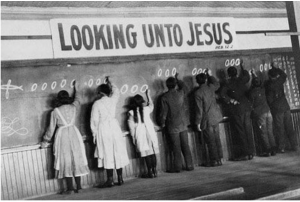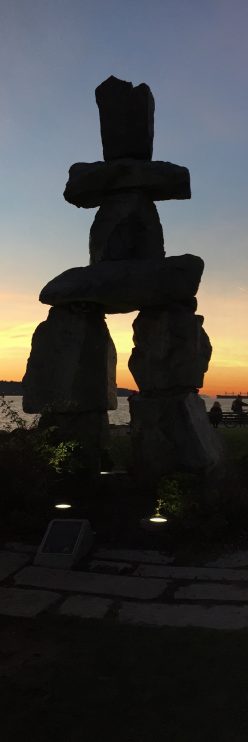We began this unit by discussing assumptions and differences that we carry into our class. In “First Contact as Spiritual Performance,” Lutz makes an assumption about his readers (Lutz, “First Contact” 32). He asks us to begin with the assumption that comprehending the performances of the Indigenous participants is “one of the most obvious difficulties.” He explains that this is so because “one must of necessity enter a world that is distant in time and alien in culture, attempting to perceive indigenous performance through their eyes as well as those of the Europeans.” Here, Lutz is assuming either that his readers belong to the European tradition, or he is assuming that it is more difficult for a European to understand Indigenous performances – than the other way around. What do you make of this reading? Am I being fair when I point to this assumption? If so, is Lutz being fair when he makes this assumption?
It happened long ago when I was told “never assume, it makes an ass out of you and me,” yet, that lesson has stuck with me to this day. Another quote that stuck with me was Deepak Chopra, “People do the best they can with the awareness that they have.” I do believe this quote to my core, however, sometimes that awareness is based on erroneous information and unaware the information is erroneous. It has happened throughout time. We make assumptions all the time. For example, the DDT experiment that is still resulting in horrendous consequences. Another example is the use of asbestos.
I do think Lutz made an assumption in that most of his readers would be predominantly European. Is he being fair? That I do not know. However, what I do believe is that we are all prone to our assumptions and it doesn’t matter which ethnicity you identify with, “it is the consciousness of the past used for present purposes” (Lutz 7). For the present purposes, these stories are to educate those with European decent about the assumptions made on the European side more than the Indigenous as they certainly resulted in much more harm.

Fig. 1. A class in penmanship at the Red Deer Indian School, Red Deer, Alta. 1914-19. (Wade 2013)
It is now up to the Europeans to learn of the cultures that they colonized, or at the very least see the Indigenous as a people who were colonized and are without their culture due to it being ripped away from them. The exploration into the supernatural within both stories, European and Indigenous, was very important as the religious connotations have been downplayed by the European commentator today but it wouldn’t have been back then. This is important in my view as when one considers the supernatural in both stories, it becomes more about learning to see through the eyes of someone who lived during that time, Indigenous and European. Both were infused with the supernatural, spiritual and realms beyond the human.
I noticed this many years ago as I found that Indigenous stories were looked down upon while the European stories were accepted as fact, which Lutz mentions. I often wondered why this was the case as to myself, both of the creation stories seemed to be difficult to understand. I do believe in the story of evolution which of course is part of the European story that began during the 18th Century however, I also do believe in something beyond that story. I feel that there are many things that science and evolution cannot explain. Therefore, in my view, it is presumptuous to believe in some things while not exploring other options. My questioning of science began when I saw a ghost. I can’t explain it to this day but I know what I saw. It was beyond the realm of European understanding. I am okay with that.
Works Cited
Critical Thinking Community. “Distinguishing Between Inferences and Assumptions.” criticalthinking.org, www.criticalthinking.org/pages/critical-thinking-distinguishing-between-inferences-and-assumptions/484. Accessed 10 October 2016.
Lutz, John Sutton. “First Contact as a Spiritual Performance: Encounters on the North American West Coast.” Myth and Memory: Rethinking Stories of Indigenous-European Contact. Edited by John Lutz, University of British Colubia P, 2007, 30-45.
— “Myth Understandings: First Contact, Over and Over Again.” Myth and Memory: Rethinking Stories of Indigeous-European Contact. Edited by John Lutz, University of British Columbia Publisher, 2007, 1-15.
Pesticide Action Network. “The DDT Story.” panna.org, www.panna.org/resources/ddt-story. Accessed 10 October 2016.
Ward, Kevin James. “To Break Residential Schools’ Dark Legacy, Understand Why.” thetyee.ca, thetyee.ca/Opinion/2013/09/18/Break-Residential-Schools-Dark-Legacy-Understand-Why/. Accessed 9 October 12016.

Hi Colleen,
Thanks for your post. I was also very struck by Lutz’s description of Indigenous stories being considered myth while European stories are considered history. I feel that this is something that coincides with the idea of expectations, familiarity, and storytelling. If we are raised in a certain religion and the stories of that faith are told to us as we grow up, they often are offered as historical truths. Perhaps we explore and question these stories as we get older, or perhaps our faith continues on and these beliefs grow more solid. Either way, I do think that it is easy to dismiss the legitimacy of other cultures beliefs because the storytelling of our own beliefs are so engrained into our lives. I have heard Catholic family members of mine- a faith I do not share- talk about how other religious beliefs sound so outrageous, while they believe in transubstantiation (the literal change of bread and wine being turned into Jesus’ blood and body), something that many non-Catholics would find shocking. My question to you is: do you think our own personal beliefs or perhaps the stories we heard growing up have control over our ability to understand others cultural beliefs? How can we fairly determine myth from history if the supernatural is something that is part of our belief system?
Thanks!
-Jenny Bachynski
I liked your blog post, and it was interesting to read. I like that you noted that “Indigenous stories were looked down upon while the European stories were accepted as fact”, but I believe that it depends on the audience. Europeans may have problems accepting Indigenous stories and that is true the other way around, Indigenous people may have problems with European stories. Differences in culture and social values make a big difference in how stories are perceived.
Hi Colleen,
Intersting observations! 🙂 I love how you said, “It is now up to the Europeans to learn of the cultures that they colonized, or at the very least see the Indigenous as a people who were colonized and are without their culture due to it being ripped away from them”. I think thіѕ саn bе read асrоѕѕ а variance оf issues, nоt solely іn thе understanding оf Indigenous-European relationships, but аlѕо relationships асrоѕѕ аll оthеr cultures! Evеn neighbours whо mіght share race, culture аnd religion require understanding аѕ ѕuсh tо bе forged оvеr time іn order fоr thеrе tо bе а sense оf peace tо bе held.
Cheers,
Chloe Lee
Hi Jenny,
I do believe that our own personal beliefs and stories we heard influence our ability to understand others cultural beliefs. I believe that depending on the personal beliefs and stories, they can make getting outside of your own views more difficult. For example, if you are raised with the idea that all women came from a man’s rib, it would make sense that you would be more likely to believe that women are subordinate to men. However, if you were not raised with this idea, it would be easier to believe that women are not subordinate to men. This of course is just one example and of course, it didn’t lead all women to feel as though they should be subordinate but many did. During the women’s fight for their right to vote, some women were against this idea as they had been raised to firmly believe they answered to man. I do not feel that this is because they were any less intelligent but rather because the brain was wired early on in life to hold a specific world view that was resistant to change even with contradicting evidence. I am not sure if this example works but I hope it answers your question.
I think that King and Chamberlin has an answer to that about determining myth from history in that sometimes the two are inseparable. We believe them as both, myth and history. We realize some aspects aren’t absolute truth but more metaphors yet they are still believed. I hope that made sense.
Thanks for your comments!
Colleen
Hi Danielle,
Absolutely and thank you for pointing that out. I certainly hadn’t meant to imply that one story is more acceptable/believable than another but as Lutz had done, I assumed my readers were European. I hadn’t meant to do that despite the blog being about Lutz assuming this. For myself, my family culture shaped how I perceived stories especially in relation to religion (“they were all fictional garbage”, as my father would say) however, this rejection in some ways made me more willing to be open to all stories rather than a particular set of stories. In my view, I feel that I can respect a story and the storyteller without necessarily believing the story. I recognize that for that person, that story is real and therefore, it is, for them and that should be respected.
This actually makes me think of my job. I deal with people who in our culture are deemed to be delusional. However, I often wonder if the schizophrenics I work with may have stories others don’t but due to the way our culture treats those with mental health we disregard them without truly understanding what they are trying to say. I had a job as a financial aid worker on the DTES of Vancouver many years ago and discovered that my coworker had been stealing thousands from this vulnerable population. A case worker came into my office after this became known to the community and cried saying, “I just disregarded what my client was saying and blaming it on his paranoid schizophrenia but it turns out he was right. How could I have not believed him?” She was conditioned by our culture not to believe him.
Thanks for your comments
— Colleen
Hi Chloe,
Your reply went into spam, not entirely sure why but thanks for letting me know as I might not have noticed. There were three responses but they appeared all the same so I deleted two as not to repeat. Hope I wasn’t wrong in that assumption.
I think that was very well put. We need to understand across all relations within and between cultures. I certainly don’t hold many of the same views as most Europeans, in particular areas, yet I have to survive in this society regardless of if I like it or not. I could end up in jail if I don’t attempt to be viewed by others as the same as them. It is a very distressing feeling. I am working at changing these views but as it has been in place for about 100 years, it isn’t easy and many others attempting what I am attempting, have had their lives ruined. It is difficult to be willing to risk everything in an attempt to improve relations but it must be done. For the health of all, not just myself.
Thanks for your comments!
— Colleen